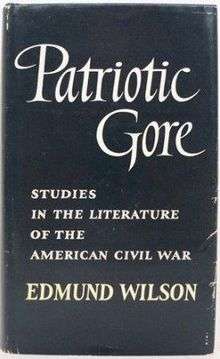Patriotic Gore
 First edition | |
| Author | Edmund Wilson |
|---|---|
| Subject | Civil War and 19th century American historical and literary criticism |
| Publisher | Oxford University Press |
Publication date | 1962 |
| Pages | 816pp. |
| OCLC | 269476 |
| 810.9 | |
| LC Class | 62009834 |
Patriotic Gore: Studies in the Literature of the American Civil War is a 1962 book of historical and literary criticism written by Edmund Wilson. It consists of 26 chapters about the works and lives of almost 30 writers, including Ambrose Bierce, George Washington Cable‡, Mary Boykin Chesnut, Kate Chopin, John William De Forest‡ (who, as Henry Steele Commager puts it,[1] "surprisingly gets more space than any other writer, North or South"), Charlotte Forten, Ulysses Grant‡, Francis Grierson‡, Nathaniel Hawthorne, Hinton Rowan Helper, Oliver Wendell Holmes, Jr.‡, Henry James, Sidney Lanier, Abraham Lincoln, John S. Mosby, Frederick Law Olmsted, Thomas Nelson Page, Harriet Beecher Stowe‡, Albion W. Tourgée John Townsend Trowbridge, Mark Twain, and Walt Whitman. In addition to De Forest, Wilson pays particular attention to Cable, Grant, Grierson, Holmes, and Stowe, choices considered "catholic and unexpected" at the time of its publication.[1]
The book's title is a reference—"wrenched rather violently"[1] —from a line about the Baltimore riot of 1861 in "Maryland, My Maryland."[2] Its introduction has been called a "mesmerizing if troubling manifesto" written "in the midst of various Cold War crises"; the introduction is a "blunt and sustained critique of the Cold War and of war itself"; it has been called "everything from shocking to naive to brilliant; some considered it unpatriotic, even un-American."[3]
Henry Steele Commager described the book as a "series of reflections on [Civil War] literature and on the men and women, and the societies, that produced it"; he characterized it as "original, skeptical, allusive, penetrating. It is discursive, ranging widely from North to South, and even more widely in time."[1][4]
References
- 1 2 3 4 Commager, Henry Steele (April 29, 1962). "Myths, Morals and a House Divided" (PDF). The New York Times. Retrieved 2012-03-26.
- ↑ Safire, William (March 16, 1984). "Essay: Patriotic Gore". The New York Times. Retrieved 2012-03-26.
- ↑ Blight, David (March 22, 2012). "Patriotic Gore is Not Really Much Like Any Other Book by Anyone". Slate. Retrieved 2012-03-26.
- ↑ "New and Noteworthy". The New York Times. November 18, 1984. Retrieved 2012-03-26.